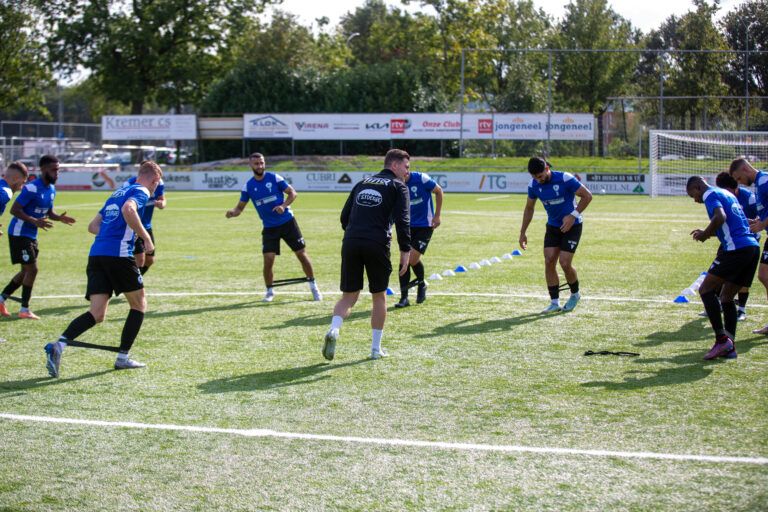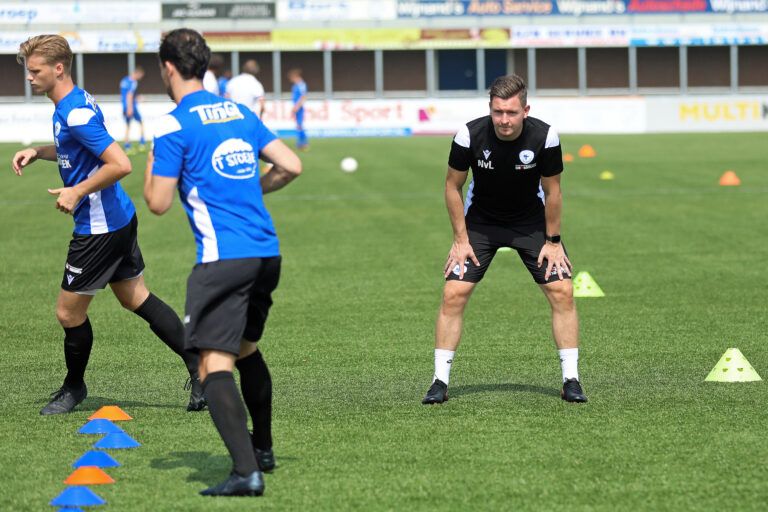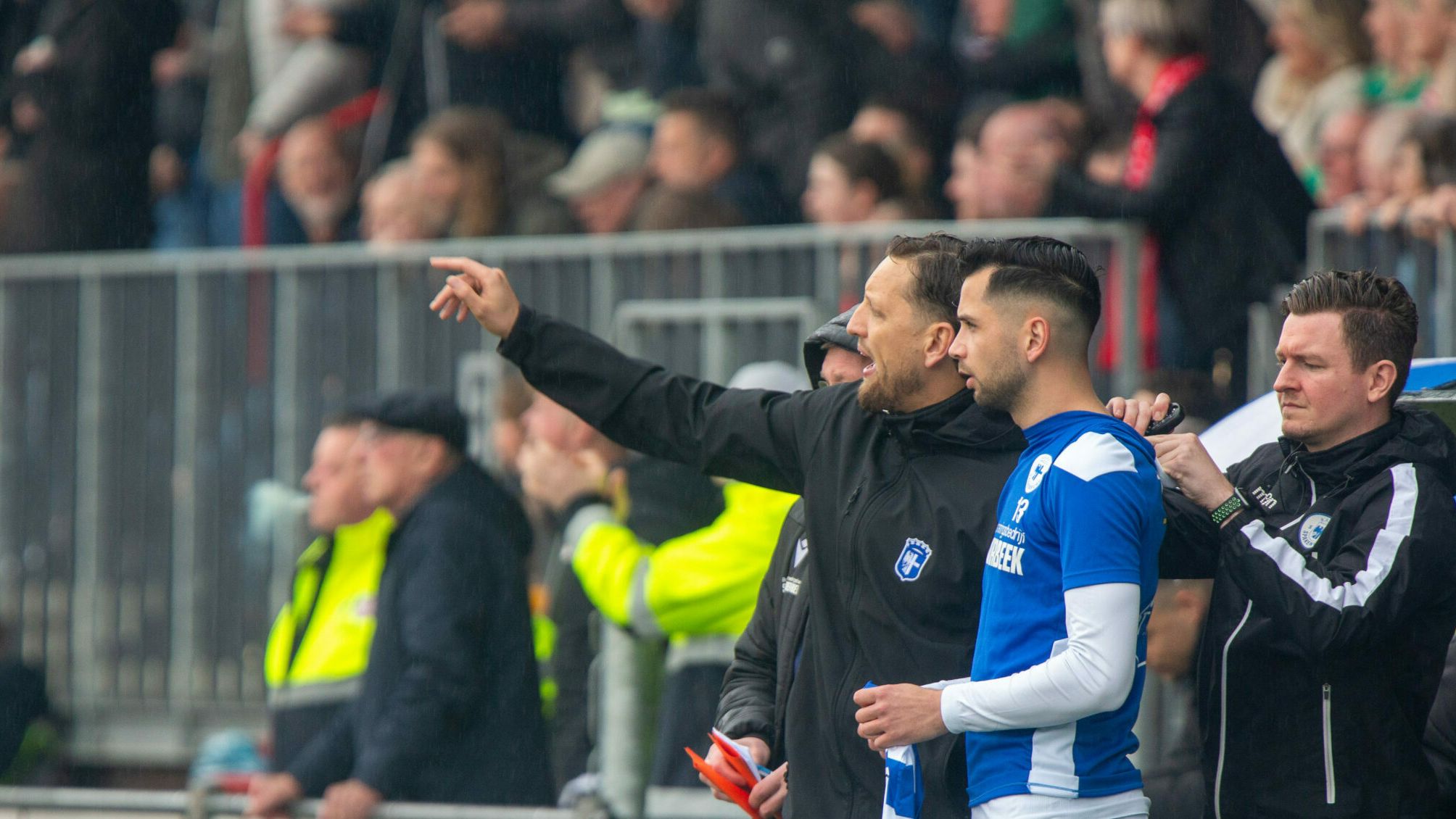Succes of Spakenburg
SV Spakenburg has been performing well for some time now. They have defeated (almost) all teams, sit at the top of the Second Division (Betnation League), and recently triumphed over Helmond Sport in the 1st round of the KNVB Cup. Quick Boys beat NAC Breda, AFC Amsterdam knocked Eredivisie side PEC Zwolle out of the cup, and HHC Hardenberg “just” defeated Heracles Almelo. Even Third Division club Sparta Nijkerk made it extremely difficult for the professionals of Fortuna Sittard and capitulated 10 minutes before the end. We can now assert that the level of amateurs has considerably increased in recent years, perhaps to the extent where they perform as amateurs at the professional level. Performance coach Niek van Logtestijn has been observing amateur football at SV Spakenburg for more than eight years. We are curious about his perspective on this and the club’s ceiling from Bunschoten-Spakenburg.burgSV SPaken
Q: Let’s begin with the recent cup success. Once again, you caused a surprise by eliminating Helmond Sport with a 3-1 victory. Has this become a regular occurrence for you now?
A: "I don’t think it will ever be entirely routine. It’s always special to defeat a professional team. However, in the past eight years I’ve been here, the technical and physical differences between us and the professional teams have significantly decreased. So while it may not be routine, the chances are increasing, and this is evident in other cup results too."
Q: Indeed, we see other amateur clubs like Quick Boys and AFC also achieving success against BVOs. Has Spakenburg become fitter compared to previous years?
A: "Certainly, the intensity in the Second Division has notably risen in recent years. Clubs now pay more attention to physical preparation and injury prevention, with performance trainers being part of their staff. It’s becoming more professional each year, and players who previously played in professional football have mentioned that sometimes the facilities here are better than at professional clubs."
Q: Is this also due to more volunteers involved in the club, working out of sheer love rather than for payment?
A: "For us, it’s not entirely volunteer work anymore, at least not as it used to be. In my case, you could consider it a second job. I can’t speak for other clubs, but serious efforts are made here to develop the club."
Q: How close are you to reaching the Keuken Kampioen Division? Could you compete effortlessly in that competition?
A: "It’s hard to say because it depends on many factors. The differences are minimal, and I believe many of our players could perform in the Kitchen Champion Division, but some choose not to. The disparity mainly lies in the number of training sessions and the tactical preparation over a full season, where professional teams have more opportunities. So there’s a noticeable distinction in that regard. Additionally, we have to balance work alongside playing football, which adds to the challenge. However, we’ve demonstrated that we can keep up well in football, even against clubs like PSV. This suggests our fitness and football capabilities are converging."
Q: How much has your role evolved from the start until now?
A: "I began two seasons as one of the physiotherapists in the medical team, and then I was asked to become the head of the medical staff. Since then, I’ve been present at all training sessions and matches. Our medical staff now comprises four physiotherapists, with at least two active during training and matches. I largely handle the “outdoor” work (GPS performance, warm-up, field rehabilitation), while one of my colleagues manages the “indoor” tasks (treatment, gym rehabilitation)."
Q: So, you’re responsible for the medical and performance policies?
A: "Yes, as the head of the medical staff, I oversee the medical and performance policies. This has significantly evolved over the years. We are continually enhancing and developing, particularly now with the new coach, Chris de Graaf. We work collaboratively to make improvements in every aspect and aim to reach and maintain the top spot in the second division."
Q: Regarding fitness and injury prevention at Spakenburg?
A: "Intensity is crucial to our style of play. Achieving intensity demands fitness, which is essential for our team’s growth. Injury prevention is also a critical aspect. We use JOHAN data to assess each player’s load capacity, factoring in their intensity and fitness. The PACER GPS-HR system aids us in applying this data during training."
Q: What’s your biggest challenge to elevate Spakenburg’s fitness?
A: "Currently, our focus is primarily on enhancing individual fitness. We’ve already raised basic fitness to an acceptable level but aim to optimize individual player performance. This necessitates more detailed and individual approaches, posing a challenge, but we’re diligently working on it."

Q: What’s the goal for the winter break?
A: "Our aim for the winter break is to maintain stable training intensity despite the irregular schedules due to cup competitions. We intend to build a strong foundation to further improve our team’s fitness and performance after the break."
Q: How do you assess Spakenburg’s fitness compared to other teams in the competition?
A: "Initially, we noticed that we gained the upper hand towards the end of matches, indicating our physical superiority over opponents. Our thorough preparation significantly contributed to this. We’ve learned not to start training too rigorously but rather strike a balance between intensity and freshness."
Q: How do players respond to measuring their performance?
A: "Players have a mixed response to measuring their performance using GPS sensors. Some, especially the fundamental players, wish to review their performance, while others are more reluctant. We try not to burden players excessively with measurements, emphasizing instead the results and enhancements in their performance. Overall, players understand the purpose behind the measurements and strive to improve."

Q: I’m also curious about your preparation for the winter break and the latter half of the season. Are there certain aspects you’re considering, or do you take it game by game? And how about the physical preparation for the next year?
A: "As I mentioned earlier, we aim to maintain a relatively constant training load. After approximately 10 weeks, I make individual adjustments, particularly concerning the competition benchmark. I review the average number of matches per player after 10 weeks to determine if we need to adjust or possibly increase the load. Until the winter break, our plan is to maintain a stable load, ensuring everyone recovers adequately and remains fresh. After the break, we’ll assess the possibility of gradually intensifying training. However, this is still in the developmental stage and will also depend on external factors, such as cup competitions."
A: "The training load will remain relatively stable until the winter break, but afterward, we’ll aim for a gradual increase. Nevertheless, we’ll need to further examine and adapt it considering the competition schedules. It’s quite a challenge because we also need to account for additional competitions like cup matches. Training too rigorously during these periods has previously led to reduced freshness on match days, something we want to avoid."
Q: To conclude, suppose Chris de Graaf’s wish comes true, and you play against Feyenoord in De Kuip. Who do you think will cover the most ground?
A: "Haha, that’s an interesting question. It depends on how the match unfolds. Feyenoord might cover more sprint meters, but if we counter effectively, our attackers could cover a considerable distance. For instance, in the KNVB Cup semi-final against PSV, the sprint meters weren’t significantly different from normal, but the high accelerations (<3 m/s) were notably higher. Mainly due to increased involvement in “football actions.” It was similar against Helmond Sport."
A: "I don’t expect us to outperform Feyenoord physically. Instead, we might have fewer sprint meters but manage to secure a win, haha."
Q: It’d be wonderful if that happens again. Thank you, and good luck for the rest of the season.
A: "Do you want to know more about the JOHAN PACER system? Get in touch via our contact page!"
